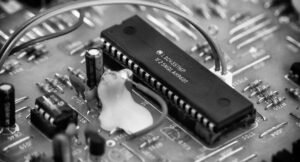Which Software Is Used to Make Artificial Intelligence?
Artificial Intelligence (AI) has become a hot topic in recent years, transforming various industries and revolutionizing the way we live and work. Behind the scenes, sophisticated software plays a crucial role in developing and deploying AI applications. In this article, we will explore some of the key software used in the creation of AI.
Key Takeaways:
- AI development relies on specialized software tools.
- Programming languages like Python and R are commonly used for AI development.
- Frameworks such as TensorFlow and PyTorch simplify the development process.
- Data management platforms are essential for AI projects.
- AI requires powerful hardware and cloud computing resources.
1. **Python** and **R** are two of the most popular programming languages used in AI development. These languages offer extensive libraries and frameworks specifically designed for AI tasks, making them highly suitable for implementing complex algorithms and models. *Python in particular has gained wide adoption due to its simplicity and versatility*.
2. AI developers often rely on specialized **frameworks** that provide pre-built functions and tools for building AI models. **TensorFlow** and **PyTorch** are two widely used frameworks that simplify the process of creating neural networks and implementing machine learning algorithms. *TensorFlow, developed by Google, has gained popularity for its ease of use and extensive community support*.
| Language | Advantages |
|---|---|
| Python | Large community support, vast collection of libraries |
| R | Statistical and data analysis capabilities |
3. **Data management platforms** are crucial for AI projects. These platforms enable efficient data collection, storage, and preprocessing. They also facilitate data labeling and annotation, which are essential for training AI models. Platforms like **Hadoop** and **Apache Spark** are commonly used for big data processing, while **MongoDB** and **MySQL** are popular for structured data management. *Effective data management is essential for training accurate and reliable AI models*.
4. To handle the complexity of AI computations, powerful **hardware** is required. **Graphics Processing Units (GPUs)** are commonly used due to their parallel processing capabilities, which significantly speed up AI tasks. Additionally, **cloud computing platforms** provide scalable computing resources for AI development and deployment. *The combination of powerful hardware and cloud resources enables AI developers to process large volumes of data and train complex models*.
| Framework | Advantages |
|---|---|
| TensorFlow | Easy to use, extensive community support |
| PyTorch | Dynamic computational graphs, popular in research |
5. **Machine learning algorithms** require large sets of labeled data to train models effectively. **Data annotation tools** play a critical role in the data labeling process, enabling efficient and accurate annotation of data for training purposes. Tools such as **Labelbox** and **Supervisely** offer features like image classification, object detection, and semantic segmentation, making data annotation more efficient and accurate than manual annotation. *Automated data annotation tools help accelerate the model training process*.
The Future of AI Software
The landscape of AI software is constantly evolving, with new tools and technologies emerging regularly. AI software developers are continually seeking to improve the efficiency and usability of their tools to keep pace with the rapidly advancing field of AI. By leveraging the right combination of programming languages, frameworks, data management platforms, and hardware resources, developers can unlock the full potential of AI and bring innovative solutions to life.
With AI becoming increasingly accessible, it is important for developers and organizations to stay up-to-date with the latest advancements and explore the diverse range of software options available to them.

Common Misconceptions
1. Artificial Intelligence Requires Highly Advanced Software
One common misconception about artificial intelligence is that it can only be developed using highly advanced and complex software. However, this is not entirely accurate. While sophisticated algorithms and technologies are indeed used in AI development, there are also several user-friendly software tools available that facilitate the creation of AI systems.
- AI can be developed using programming languages like Python, Java, or C++.
- Platforms like TensorFlow, PyTorch, and scikit-learn provide libraries that simplify AI development.
- Cloud-based AI platforms, such as Azure Machine Learning and Google Cloud AI, make it easier to build and deploy AI solutions.
2. AI Development Requires Extensive Coding Knowledge
Another misconception is that developing AI systems requires extensive coding knowledge and expertise. While coding skills are undoubtedly beneficial for AI development, there are also no-code or low-code platforms available that allow individuals with minimal coding experience to create AI solutions.
- No-code platforms like Bubble and Power Apps enable users to build AI systems without writing code.
- Low-code platforms like OutSystems and Mendix offer visual development interfaces to simplify AI development.
- AI development tools often provide pre-built models and templates that can be customized without deep coding knowledge.
3. Popular Software for AI Development is Expensive
Many people believe that software used for AI development is prohibitively expensive, making it inaccessible to individuals and small businesses. While some advanced AI tools and platforms may come at a cost, there are also several open-source software options available that allow users to develop AI systems without financial constraints.
- Open-source frameworks like TensorFlow, PyTorch, and Keras provide powerful AI development capabilities for free.
- Software development kits (SDKs) provided by tech giants like Microsoft, Google, and Amazon often offer free tiers for building AI applications.
- Cloud-based AI platforms often have pay-as-you-go pricing models, allowing users to access AI tools on a budget.
4. Only AI Experts Can Develop AI Systems
There is a misconception that only AI experts or data scientists with advanced degrees can develop AI systems. While expertise in AI and machine learning is undoubtedly valuable, many software tools are designed to democratize AI development, enabling individuals from various backgrounds to create AI solutions.
- Online courses and tutorials provide accessible resources for learning AI development skills.
- User-friendly AI platforms offer guided workflows and intuitive interfaces, making AI development more approachable for non-experts.
- AI communities and forums provide support and collaboration opportunities, allowing individuals to learn from experienced practitioners.
5. AI Software Can Replace Human Intelligence
One widespread misconception is that AI software can completely replace human intelligence. While AI systems can perform complex tasks and automate certain processes, they are still far from replicating the breadth and depth of human intelligence. AI is designed to enhance human capabilities rather than replace them.
- AI excels at performing repetitive or data-intensive tasks with speed and accuracy, complementing human efforts.
- Human judgment, creativity, and empathy are essential aspects of decision-making that AI currently cannot fully replace.
- AI systems often require human supervision and intervention to ensure their effectiveness and correct biases.

Software Used in Artificial Intelligence
In the field of artificial intelligence (AI), several powerful software tools are used for various purposes. Here are ten noteworthy software programs that are widely employed in AI research and development:
Software Used for Natural Language Processing (NLP)
Natural Language Processing (NLP) is a vital area in AI that focuses on enabling computers to understand, interpret, and respond to human language. The following software tools are pivotal in NLP:
Software Used for Machine Learning
Machine Learning (ML) algorithms are the backbone of AI systems that can learn and improve from experience. These software tools are frequently employed in ML tasks:
Software Used for Deep Learning
Deep Learning is a subset of ML that utilizes artificial neural networks to simulate human-like learning and decision-making. The following software tools effectively support deep learning processes:
Software Used for Computer Vision
Computer Vision is an AI field that focuses on enabling computers to decipher and understand visual data. The following software tools are extensively used in computer vision tasks:
Software Used for Data Labeling
Labeling and annotating massive datasets is an essential step in training AI models. The following software tools assist in data labeling tasks:
Software Used for Robotics
Robotics combines hardware and software to create intelligent machines capable of performing tasks in the physical world. The following software tools are crucial in robotics development:
Software Used for Reinforcement Learning
Reinforcement Learning is a type of ML where an AI agent learns through trial and error in an interactive environment. The following software tools are frequently applied in reinforcement learning scenarios:
Software Used for Speech Recognition
Speech recognition technology enables computers to convert spoken words into written text and is applicable in various AI applications. The following software tools are crucial in the field of speech recognition:
Software Used for Virtual Assistants
Virtual Assistants are AI-powered bots that provide interactive and personalized responses to user queries. The following software tools play a significant role in virtual assistant development:
To create and advance artificial intelligence, a combination of diverse and powerful software tools is required. These tables offer a glimpse into the wide range of software used across different AI disciplines, such as natural language processing, machine learning, computer vision, and robotics, just to name a few. The field of AI continues to evolve rapidly, with software playing a crucial role in its continuous innovation and advancement.
Frequently Asked Questions
Which software is commonly used to make artificial intelligence?
There are several software tools and frameworks available for developing artificial intelligence applications. Some commonly used software includes TensorFlow, PyTorch, Caffe, Theano, and Microsoft Cognitive Toolkit (CNTK).
What is TensorFlow?
TensorFlow is an open-source machine learning framework developed by Google. It provides a wide range of tools and libraries that help in building and training deep neural networks for artificial intelligence applications.
What is PyTorch?
PyTorch is another popular open-source machine learning framework developed by Facebook’s AI Research lab (FAIR). It provides a dynamic computational graph that allows for flexible and efficient network structure modifications during the training process.
What is Caffe?
Caffe is a deep learning framework developed by Berkeley Artificial Intelligence Research (BAIR). It is primarily used for image recognition tasks and is known for its speed and efficiency.
What is Theano?
Theano is a Python library that allows for efficient symbolic mathematical computations, especially useful for deep learning applications. It provides a high-level interface for defining and optimizing mathematical expressions involving multi-dimensional arrays.
What is Microsoft Cognitive Toolkit (CNTK)?
Microsoft Cognitive Toolkit (CNTK) is an open-source deep learning toolkit developed by Microsoft. It supports efficient training of various deep learning models and is known for its scalability and performance.
What are some other AI software tools?
Apart from the mentioned software tools, there are other widely used AI software tools like Keras, scikit-learn, IBM Watson, Matlab, and many more. These tools provide a range of functionalities and are designed for different AI applications.
Which programming languages are commonly used in AI software development?
Python is the most popular programming language for AI development due to its simplicity and the availability of various AI libraries. Other commonly used programming languages include Java, C++, and MATLAB, each with its strengths and specific use cases.
Can I develop AI applications without coding knowledge?
While coding knowledge is beneficial for developing AI applications, there are also user-friendly AI platforms that allow non-coders to build AI models using drag-and-drop interfaces or predefined templates. These platforms often abstract the coding complexities but may have limitations in terms of flexibility and customization.
Are there any cloud-based AI platforms available for developers?
Yes, several cloud-based AI platforms like Google Cloud AI, Microsoft Azure AI, and Amazon AWS AI services are available for developers. These platforms provide pre-built AI models, machine learning APIs, and infrastructure for deploying and scaling AI applications in the cloud.





